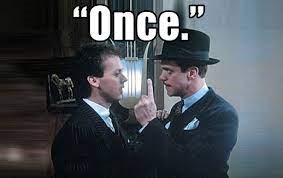-
Posts
4564 -
Joined
-
Last visited
-
Days Won
200
Everything posted by Carborendum
-
Wow. I had a hard time believing that was written by a liberal. But I realized that it was an old school liberal who had not bowed to the woke mob. A lot of people have not changed their positions. But the parties have moved the needle.
-
Matsah can be hard like crackers or soft like a pita. And it very often has salt and oil for flavor.
-
If it isn't interesting to the internal politics of the US, the news has nothing to spin. So, why would they waste breath on it? I'm sure you'll find one or two articles about these things on virtually every news outlet. But they're not really pushing them too hard. It doesn't sell.
-
I'm not sure why this is important. The Greek word for paradise, depending on context, can mean any of the following: The abode of the dead (the spirit world) The place of the pious awaiting resurrection (paradise) Heaven (any of the kingdoms of glory) So, any of these meanings can be accurate no matter what you think is going to happen to this man. But we have to ask ourselves what was Jesus trying to say? Why would He have said "verily, verily..."? It didn't sound like He was trying to condemn him as if it were too late. It sounded like He was trying to encourage him. It wouldn't be much of an encouragement if He were referring to spirit prison. The man certainly seemed repentant. He was willing to take responsibility for his sins. He showed remorse. He spoke to Jesus in humility. He showed faith in Christ. If all this is true, wouldn't he be ushered into Paradise? What is the point of sifting through the definitions? Are we trying to condemn this man to spirit prison when he showed repentance? What is it so important?
-

Question concerning “Continuing Revelation”
Carborendum replied to Maverick's topic in LDS Gospel Discussion
You still haven't provided any links to specific examples. You made the claim. You need to back it up. But let's assume you're correct (you could be). That is by no means an indication. I'll give you an example. Did you know that for many years people thought Joseph had the First Vision at 15 (16th year of age) rather than 14? True. This was because of a side note that the scribe (Fredrick G. Williams) wrote as a superscript in the 1832 account. As far as we know, Joseph never spoke those words. Yet that version was widely circulated saying "15 years old." Virtually everyone believed it and everyone repeated it. But with so many other versions (which were less popular for a while) saying 14 years, it was eventually corrected among the common membership. So, mistakes can happen en masse a lot more often than people like to admit. Just look at mainstream Christianity. And, yes, it is quite possible that multiple accounts misheard or misunderstood exactly what words were used in the speech, and what their meaning really was. And, of course, there is one more test for valid revelation: What other apostles then repeated Young's doctrine in their own words and by the Spirit of Revelation? You said many of his contemporaries repeated his words. I'm aware of people quoting him, but not adding their witness of the Spirit to Young's words. Show the links. -
I'm pretty sure they were. But the subtle changes of the artist's hand were just enough to give the "hyper-ideal" figures some qualities that simply wouldn't exist in a real human being.
-

Question concerning “Continuing Revelation”
Carborendum replied to Maverick's topic in LDS Gospel Discussion
That doesn't answer the initial question I had. Why is the record speech the way it is? That simply isn't a complete record. And without the complete record, any snippets,. secondhand quotes, etc. simply are not sufficient for us to figure out what the heck he was saying. I'd hate to think what people might think about many things I said without proper background. -

Question concerning “Continuing Revelation”
Carborendum replied to Maverick's topic in LDS Gospel Discussion
Not really. I was looking for (as Mav claimed) specific examples of Young's tendency to jump back and forth between topics without preamble or segue. I've read through the JoD and never noticed this tendency anywhere besides the A-G theory. It was so unusual that I distinctly remember the first time I ever read it, thinking,"This is really strange. Where did that come from? It has nothing to do with the topic he was just talking about. It came out of left field." Then when he was done with that, he seemed to pickup right where he left off. Literally, if you plucked A-G out of the discourse, it would seem like a perfectly seamless discourse. No other changes required. I have seen many times that speakers (incl. Young) would make a statement that he would give a little background that was tangentially related. And that background was necessary to understand the next section of the original topic. To some, this seems like jumping around. I don't because that is the way I do some discourses myself. But none of the discourses I've seen was as stark as A-G. None of them made me get whiplash from simply reading it. A-G did. That is why I believe there was some sort of mistake with this record, as well as the way people heard it. -
I'll tell you two stories: 1. I was at school and found a girl sitting alone. I started up a conversation with her. We did some nice flirting for a while. It was fun. After a while, another guy came up and asked if she was ready to go. From their interactions, I gathered they were married (calling her "hon" and so on). I felt kind of embarrassed and disappointed. She was cute. 2. My sister had a few friends over to her apartment. All of them had husbands. One of them talked about "dressing sexy." I don't know if those were the exact words they used. But that is how I remember it. Because I was very quiet and "the hostess's brother" most of the ladies were very free with their speech. They indicated that it was not just the normal "competing with other women." It was about attracting other guys. I eventually interjected,"But aren't you all married?" "Yeah. But that doesn't mean we don't like attention from other men." I kind of looked at them with a quizzical look. "It's flattering to get hit on by a guy. And it's completely safe when all you have to do is lift up your hand and show your ring." I still don't know whether this is good behavior or not. But I do know that you are not alone in wanting to feel pretty and desirable.
-

Question concerning “Continuing Revelation”
Carborendum replied to Maverick's topic in LDS Gospel Discussion
Uhmm... Gee... Thanks... -
Uh-huh. I'm sure there was no artistic license on the crafting of the features for animation.
-
We actually do the four questions and go over the plagues of Egypt on Easter Sunday. We eat the traditional Paschal foods for Easter dinner and talk about links between the deliverance of the Israelites from Egypt and the deliverance of man from sin.
-

Question concerning “Continuing Revelation”
Carborendum replied to Maverick's topic in LDS Gospel Discussion
So, no link? -

Question concerning “Continuing Revelation”
Carborendum replied to Maverick's topic in LDS Gospel Discussion
Links? -

Question concerning “Continuing Revelation”
Carborendum replied to Maverick's topic in LDS Gospel Discussion
That's because we don't really know what Brigham Young meant. If you look at the transcript of the speech he gave there was something disjointed about it. Start: Speaking about something completely normal. Insert: Adam-God. Continue: Speak about the original subject again. The issue is that there was no segue from each of these sections. There didn't seem to be any relationship between Adam-God and the rest of his speech. This tells me that either: A. There was some explanation or preamble that we're missing that would have given us valuable background concerning his comments. B. This was thrown in there when someone mixed up notes from multiple speeches. Bottom line: We don't have the proper background to understand what it was that he was talking about. -
VID_20240408_133952.mp4
-

The Book of Mormon – what’s new to you?
Carborendum replied to Traveler's topic in LDS Gospel Discussion
The "bar" has a footnote to Moroni 10. I noted that the "bar" (from Moroni 10) used in conjunction with "Eternal Judge" indicates that the "bar" spoken of is about the final judgement. Maybe, maybe not. I was thinking of "the bar" that is used in modern settings for the inner area in the courtroom for the judge and lawyers. So, I could see this referring to God as the ultimate judge. Therefore, we meet at his bar. The problem is that this usage of the word "bar" is of modern origin. It was far later than Moroni, and certainly later than Jacob. So, why is this "bar" used in these verses? It is easy enough to say that these were simply the best modern language equivalents to ancient figures of speech. And it could be. But I just don't feel right about it. Another answer didn't occur to me until I re-read the words: This isn't the bar of a modern courtroom. This is a scepter, either of the Egyptian Pharaoh or a Judge of Israel (or possibly some combination of the two). I prefer that dual symbolism of the Egyptian Pharaohs. The flail and scepter were double-dual symbols. The flail could punish disobedient servants, or it could be used to thresh wheat, thus providing for the people. The shepherd's crook was either a way to STRIKE down a criminal, or to bring a repentant soul into the fold. To say that the bar (staff, rod, etc.) was "pleasing", and then say that is striketh fear and dread, would indicate a dual symbol. -

Question concerning “Continuing Revelation”
Carborendum replied to Maverick's topic in LDS Gospel Discussion
Joseph once said that he could reveal 100 times more about the degrees of glory than what was revealed in the various sections of the D&C, as soon as the Saints were prepared to receive it. Joseph knew. But he also recognized that the Saints were not ready to hear it. He said If it was that difficult for what might (in the Church) be considered "the greatest generation" imagine what our generation is prepared for? Are they the great and noble generation saved for the last days? Or are they the lost generation being tossed about by every wind of doctrine? When I look at the many youth in the four stakes I've been frequenting, I'd say "Yes." -

Question concerning “Continuing Revelation”
Carborendum replied to Maverick's topic in LDS Gospel Discussion
Yes, it is as I said. You'll notice that he kind of pauses as he defines it as revelation. His eyes are going to different places. So, he's not reading it directly, but kind of paraphrasing as he goes. He glances at each of the prompts as required. But he is in no way reading it directly. Also notice that there are several other places where he uses different words than the written version. But I don't see anyone making a big stink about those. -

Question concerning “Continuing Revelation”
Carborendum replied to Maverick's topic in LDS Gospel Discussion
There have been many times when I've heard one word or phrase in Conference, but saw the written version was off by just a bit. I finally realized that sometimes, a speaker knows his talk well enough that he doesn't need to read it off the teleprompter. This has been the case for me many a time. So, he speaks it as he remembers it. He may still glance up a few times so he doesn't lose his place. But for the most part, it just comes from whatever he remembers. Meanwhile, the original written version is what is published on the website and in the Liahona/Ensign. There really is no curating the similarities and differences between spoken v. written. Both are recorded. Both are official. Both mean the same thing. So, the written word vs the spoken word may differ in detail, without a difference in meaning. While I'm a fan and practicioner of exegesis, at some point, we must realize that the only "official meaning" of prophetic words is through the Spirit. And as long as your interpretation is within the reasonable limits of what has been spoken, then you have a credible claim to having revelation confirm the prophets' words. EDIT: BTW, I couldn't find the talk you referenced. I looked at the talks from Pres. Packer for both the April and Oct sessions from 2012 to 2015. None of them used the words you referred to. -

Question concerning “Continuing Revelation”
Carborendum replied to Maverick's topic in LDS Gospel Discussion
I can't. Sometimes when we're given revelation, we're not allowed to repeat it. I was trying to simply point in a direction. But just as pointing in real life would require our eyes to be in the same location with reference to the pointing finger, we're not aligned. And you're seeing in a different direction than what I intended. -

Question concerning “Continuing Revelation”
Carborendum replied to Maverick's topic in LDS Gospel Discussion
Ok..... So, that's what you got from what I said. ... I don't even know where to go from here. Good object lesson. -

Question concerning “Continuing Revelation”
Carborendum replied to Maverick's topic in LDS Gospel Discussion
If I were to make a rough guess, I'd say that I've given close to 1000 blessings in my life. Healing, comfort, promise of blessings, & prophecy. Of those, I'd guess about 10% were very clear blessings where I KNEW there was power there. About 10% were clearly empty. I was "practicing the forms without the power." Finally, the great majority were something in between. I really couldn't tell. I didn't necessarily feel like there was power there. But it also didn't feel empty. As you can imagine, those where I clearly felt the power -- these were always fulfilled. Those where I knew were empty were never fulfilled. Of the remaining? Maybe 50% if I'm lucky were fulfilled. I think you can draw some parallels.







